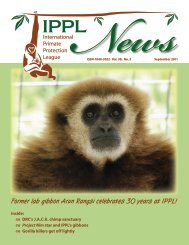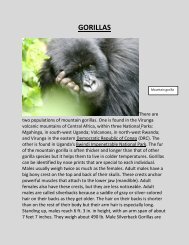Sammy - International Primate Protection League
Sammy - International Primate Protection League
Sammy - International Primate Protection League
You also want an ePaper? Increase the reach of your titles
YUMPU automatically turns print PDFs into web optimized ePapers that Google loves.
End of the “Baby Monkey” Case: Humans Get Off Scot-Free<br />
At a hearing held on 15 December 2004,<br />
Chicago’s U.S. District Judge Ruben<br />
Castillo accepted a plea agreement,<br />
negotiated with the U.S. Department of<br />
Justice and the U.S. lab animal breeding<br />
and importing firm LABS of Virginia.<br />
Under the plea agreement, the government<br />
agreed to dismiss all charges against three<br />
indicted LABS officers and to fine the<br />
company a mere $500,000 for illegally<br />
importing baby monkeys from Indonesia<br />
in 1997.<br />
T h e a g r e e m e n t was<br />
entered last August between<br />
the defendants and the U.S.<br />
attorney’s office. It is sobering<br />
to reflect that, despite illegally<br />
and inhumanely importing<br />
hundreds of primates into<br />
the U.S., all the human<br />
defendants got off scot-free.<br />
The company’s modest fine<br />
was a result of pleading guilty<br />
to just one felony count of<br />
submitting false records.<br />
Sadly, the monkeys didn’t<br />
escape their fate of living as<br />
U.S. laboratory animals.<br />
In 1997 Dr. Shirley McGreal reported<br />
in IPPL News on an eyewitness account of<br />
dozens of baby monkeys packed into Air<br />
France crates at Chicago’s O’Hare Airport.<br />
In April 2002 the importing company,<br />
LABS of Virginia, and three of its officers<br />
were indicted. LABS and its President,<br />
David Taub, were each charged with eight<br />
felonies and four misdemeanors (12 counts<br />
each) and faced steep fines and long prison<br />
terms, with two other LABS officials each<br />
Baby monkey at LABS<br />
——————————————————————— IPPL NEWS<br />
www.ippl.org ————————————————— April 2005<br />
21<br />
facing one criminal charge.<br />
The case ultimately involved over a<br />
thousand crab-eating macaques, including<br />
many pregnant monkeys and unweaned<br />
babies as young as three to five weeks old,<br />
who had been sold by the Indonesian animal<br />
dealer Agus Darmawan. Shipment of infant<br />
animals violates U.S. law. In addition, IPPL<br />
obtained evidence showing that the April<br />
and May 1997 shipments had included<br />
not only baby monkeys, but also wildcaught<br />
adult monkeys shipped<br />
on fraudulent “captive-born”<br />
documents acquired through<br />
bribes paid to Indonesian<br />
officials.<br />
In the months and years<br />
following the discovery by<br />
IPPL of these violations, Dr.<br />
McGreal and IPPL members<br />
protested to numerous<br />
officials around the world,<br />
calling for all involved to be<br />
investigated and prosecuted.<br />
Unfortunately, IPPL<br />
believes that justice has<br />
NOT been served in this<br />
case.<br />
© Ann Haynes<br />
U.S. <strong>Primate</strong> Laboratory Under Investigation<br />
The New Iberia Research Center<br />
(NIRC, http://nirc.louisiana.edu/) at<br />
the University of Louisiana, Lafayette,<br />
Louisiana, houses around 6,000 primates,<br />
including over 400 chimpanzees and<br />
thousands of macaque monkeys used in<br />
a wide range of experiments.<br />
NIRC is funded primarily by<br />
pharmaceutical companies and the U.S.<br />
National Institutes of Health (NIH). The<br />
center, formerly known as Gulf South, is<br />
currently being investigated by the U.S.<br />
Department of Agriculture for possible<br />
Animal Welfare Act (AWA) violations.<br />
In February 2005 a former employee<br />
named Narriman Fakier filed a lawsuit<br />
alleging that she was fired for “blowing<br />
the whistle” on animal cruelty and<br />
violations of AWA at the center.<br />
Fakier contended that monkeys died<br />
of exposure to the cold, that employees<br />
burned the backs of chimpanzees’ hands<br />
with lighters, and that animals were<br />
being anesthetized in groups, a practice<br />
forbidden by the AWA. Fakier accuses<br />
the university of wrongful termination,<br />
retaliatory discharge, violation of free<br />
speech rights, and violation of whistleblower<br />
statutes.<br />
Fakier, a 20-year veteran in the animal<br />
research field, worked at NIRC from<br />
September 2002 until February 19th,<br />
2004. She is seeking a jury trial and<br />
compensatory damages for lost income<br />
and loss of future earnings.<br />
University President Ray Authement<br />
denied the allegations. He stated that the<br />
center had received complaints about the<br />
sizes of cages, but that he knows of no<br />
serious reported violations that had not<br />
been resolved.<br />
The U.S.-based organization Stop<br />
Animal Exploitation NOW (S.A.E.N.,<br />
http://www.all-creatures.org/saen/) has<br />
used the Freedom of Information Act to<br />
obtain documents related to the center.<br />
Michael A. Budkie, A.H.T., Executive<br />
Director of S.A.E.N., commented,<br />
Our preliminary findings indicate<br />
that something is substantially wrong<br />
at the New Iberia Research Center.<br />
Government documents show that rhesus<br />
monkeys at NIRC are suffering and dying<br />
due to negligence and lack of adequate<br />
care.<br />
Necropsy reports obtained by S.A.E.N.<br />
from the NIH document that many animals<br />
at NIRC are emaciated, dehydrated, and<br />
suffering from physical trauma. <strong>Primate</strong>s<br />
that routinely live until 30 or more are<br />
usually dying at age 3 or less.<br />
Budkie added,<br />
We want the public to know the<br />
truth about what happens to animals at<br />
NIRC. We have asked NIRC officials for<br />
additional records to adequately examine<br />
the situation at NIRC. We hope that this<br />
lab will abide by the laws of Louisiana<br />
and provide the information we have<br />
requested.










